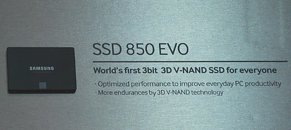Tuesday, September 9th 2014

Samsung 850 EVO SSD Coming Soon
Samsung and the world's second solid-state drive based on 3D vertical-NAND flash technology, the 850 EVO, was spotted on marketing material, ahead of its launch. Closely trailing the company's flagship 2.5-inch SATA 6 Gb/s drive, the 850 Pro, the 850 EVO will have lower price per GB. The drive will be based on Samsung's 3-bit (TLC) 3D V-NAND chips, and Samsung's updated triple-core processor. Given how Samsung is offering a stunning 10-year warranty with the 850 Pro, this drive could come with a similar warranty. The 850 Pro, for example, is rated with a TBW ceiling of 150 TB, double that of its predecessor.
Source:
Expreview

8 Comments on Samsung 850 EVO SSD Coming Soon
www.overclock.net/t/1507897/samsung-840-evo-read-speed-drops-on-old-written-data-in-the-drive
and completely independent from a German site:
www.computerbase.de/forum/showthread.php?t=1381604
It seems like the 'Wear Leveling' algorithm of the 840 EVO reorganizes old data in a fashion that they can't be read out in parallel anymore. In consequence, old files are being read slower and slower. That's the most plausible theory so far at least.
So far, every person with an EVO which is at least a couple of months old found the same problem. Just note that a 'normal' benchmark will not show the problem because it will only affect old files.
Rewriting the old files (e.g. copying or using a defragmentation tool) will bring them up to speed again.
Link where I posted it:
www.overclock.net/t/1507897/samsung-840-evo-read-speed-drops-on-old-written-data-in-the-drive/90#post_22818618
And direct download to the FileBench.zip attachment:
www.overclock.net/attachments/25914
If you find that your read speeds are slow, you can try to defrag the SSD and check your speeds afterwards. Note that the reason for the slow read speeds are most likely not the fragmentation. The fact that certain defragmentation methods work is just because most data will be written to new flash cells.
But it's also likely that normal defragmentation might not cover all slow files because it just looks for fragmentation and creates a large continuous area but it doesn't know about the organization of the file data on the actual SSD.
Normally defragmentation doesn't help much if any with optimizing SSDs and should be avoided due to all the additional writes to the flash cells. But the EVO seems to have a specific problem where defragmentation can indeed help.
the only problem is, the drive has the same speed after multiple secure erases.
the read speed was dropped from 510 to 360-390mb/s. i think the last firmware could be the problem. the changelog showed a modified turbowrite algorythm. that updated speeded up the sequential write to 400mb/s.